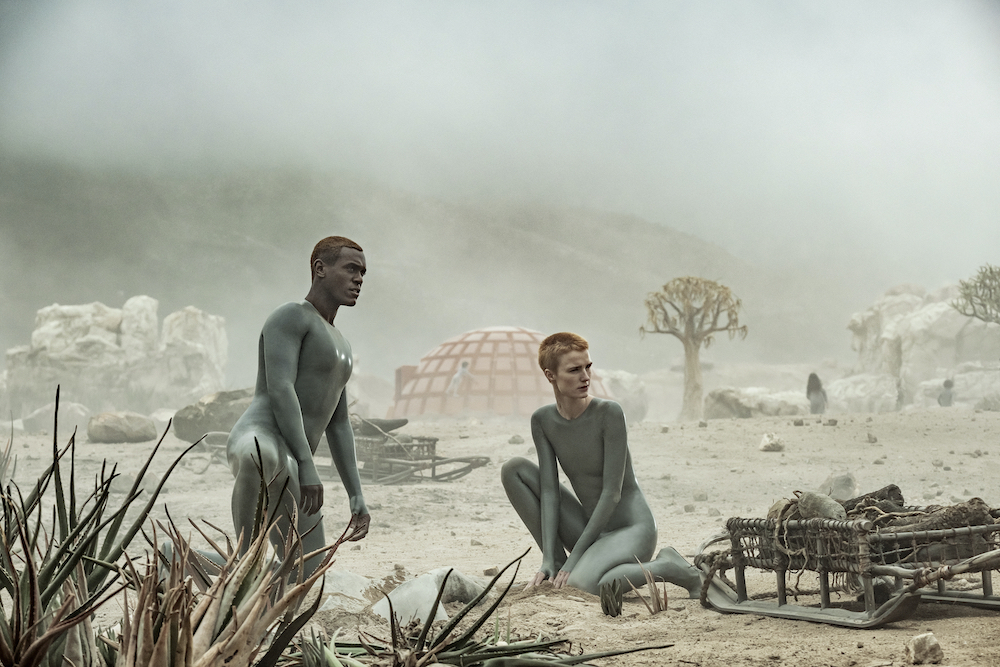“Raised by Wolves” is the type of sci-fi project that deserves some respect for its ambition alone—whatever you feel from it, you have to admire its full commitment to its Biblical proportions, and the way that it uses its androids and killers to tell a story about faith and parenting. Ridley Scott directed the first two episodes of the series, and using his name as part of the marketing is a fair move (even if it was created by Aaron Guzikowski, who wrote “Prisoners.”) This space oddity is very much of Scott’s more exploratory, and out-there stories, like settling into Scott’s “Prometheus” for the first time. And like that film, “Raised by Wolves” could inspire a lot of conversation, and it just as similarly could inspire people to write it off.
The setting for the series is a war-torn world in the future that has been divided between atheists and a group of people called the Mithraic who believe in an entity called Sol. On top of that, it’s a world in which androids exist, used by humans to various capacities of creation and destruction. In bits of flashbacks provided, the Earth has been destroyed by a devastating war made worse by the use of androids, who hover around blown-up cities in Christ-like poses, letting out a scream that blows up things and also people. Meanwhile the Mithraic look like Crusaders in lacrosse pads, with a symbol of the sun representing Sol.
But first it starts with stoic androids Mother (Amanda Collin) and Father (Abubakar Salim), trying to make a new Eden on the faraway planet of Kepler-22B, which begins with raising six human babies. Over the course of 12 years, only one child survives (Winta McGrath’s Campion), causing the two to question their worth as parents. As the more headstrong and deadly of the couple, Mother then goes to a Mithraic ark up in space to take more children for her version of Eden, against the children’s own interests. Mother is an atheist, and the children, who have their own personalities that come out in various group scenes on the desolate planet, are devout believers in Soul.
Meanwhile, there’s a warrior named Marcus, a character with a wild backstory that shows how drawn-out, if not convoluted, the series can easily be. Back on Earth during a massive battle in Boston, atheists Marcus (Travis Fimmel) and his wife Sue (Niamh Algar) took over the lives of two believers, so that they could escape on the ark. They don’t realize until later that taking over these identities now means that they have a son named Paul (Felix Jamieson). Over the course of a deep sleep during the ark’s transportation, in which everyone’s mind is able to hang out while their bodies are asleep, Marcus and Sue grow close to Paul. When the boy is taken by Mother, Marcus and Sue scheme to manipulate a group of heavily devout Mithraic searchers on Kepler-22B to get Paul back. All the while, the boy does not know that these are not his real parents.

There is a lot going on in this story, as you might have been able to guess. It’s a series that asks a lot from the viewer, in part because its parallel stories of parenting feel like they’re part of a large prologue for the first two episodes. The show as a whole doesn’t really start to click by episode three (the first three episodes of the series will be released on the debut date of September 3). For all of the world-building that it does, and the way it tinkers with android character-building, “Raised by Wolves” struggles to fully grab you aside from getting you acclimated to its dry, heady idea of the future.
That’s the other major problem that plagues “Raised by Wolves”—you can see all the grandiose ideas that are unfolding in the series, especially anything related to faith, and the way that planting a seed of doubt in someone’s mind can be so powerful. But the intellectual exploration of this story, unfolding in front of such a murky backdrop that could easily be called hardcore sci-fi, is incredibly cold. It tries to be emotional with its performances, especially as Collin and Salim mix flat line delivery with sensitivity, expressing in stiff scenes their anxieties about parents. But then there’s the two humans, Marcus and Sue, and their story is even less emotionally engaging. “Raised by Wolves” feels more like reading a list of its themes instead of feeling for the characters who enact them.
The later episodes (and there will be no spoilers) indicate that there is some strong plotting to this story ahead, even if you’re not entirely sure where it could end up. I wouldn’t want to watch a movie like Ridley Scott’s “Prometheus” only half-way through, and that’s kind of the case with this series that starts to make bigger promises by episodes four and five (press was only provided six episodes). There’s a backstory with Mother that might be the best flashback the series has so far, and yet there’s no sense that it’s going to lead to anything revelatory outside of the plot.
Watching “Raised by Wolves,” you feel a certain gratitude that someone can still make sci-fi projects like this, that creatives can keep tinkering with our thoughts of the future while reflecting modern themes back at us. Even if you’re more on the fence about whether it all works—or rather, whether it gets you at an emotional level—it’s certainly not going to provide you with typical sci-fi imagery. “Raised by Wolves” is original sci-fi at its most polarizing, and that factor seems to be why it even exists.
Six episodes screened for review.












